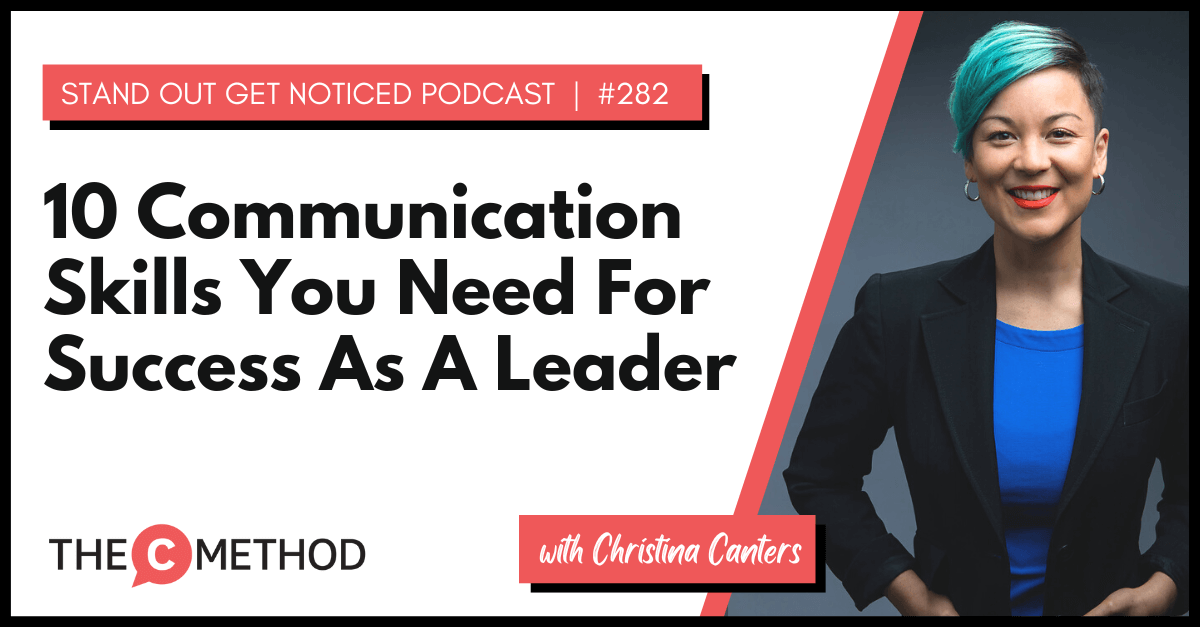 You already know that communication skills are beneficial to your success as a leader, as well as to the performance of your team.
You already know that communication skills are beneficial to your success as a leader, as well as to the performance of your team.
But what specifically does this look like? In this episode, discover the 10 communication skills you need to take your leadership (and team) to the next level.
If you’re a new listener, this episode will give you an overview of my approach to learning communication skills, and if it resonates with you, then I recommend you subscribe to the podcast and check out the archive – the past episodes are still relevant today!
If you know this podcast well, this episode will be a great review for you – to check in with yourself and reflect on where you’re at with your communication, and what areas you could still improve.
10 Communication Skills You Need For Success As A Leader
1. Managing your mindset
This includes:
- Self awareness
- Pinpointing your own thoughts
- Shifting the unhelpful stories you tell yourself
Why is managing your mindset important? All your actions and subsequent results stem from this one thing – your mind! As Albert Einstein said: “We can’t solve problems by using the same kind of thinking we used when we created them.”
2. Emotional intelligence
This includes:
- Recognising your emotions as they arise, such as fear and anxiety
- Using them, or not using them, in the moment.
- Recognising emotions in others, and responding to them appropriately
Having the skill of emotional intelligence helps to reduce your stress and to be more calm, which then enables you to communicate more effectively, instead of reacting.
3. Non verbal communication
This includes:
- Body language – such as how you sit, stand, walk
- Your facial expressions, including eye contact.
- Where you sit in a meeting, or stand when you’re on stage.
- On a video call, are you positioned properly on the screen? Is your face smiling and engaged or looking terribly bored?
Why is this important? It helps you to have a strong presence. You can command respect before you’ve even opened your mouth! Studies have shown that your body language can shape your mindset and make you feel more confident and powerful or weak and less confident.
4. Clarity of message
Clarity of message is about WHAT you say. It includes:
- Using stories to communicate your message
- Structuring your message well
- Using clear and concise language
5. Tone of voice
This is HOW you say it. Includes:
- Pace – fast/slow
- Pitch – high/low
- Emotion – compassionate, angry, excited – completely changes the meaning of your message
6. Spontaneity
Let’s face it – we all think we can control how other people respond to us, but in reality, we have zero control. Audiences will respond to you however they want. Interruptions happen. Therefore, it’s very important to be ok with being spontaneous. This includes:
- Answering Q&A
- Meetings
- Conversations
Think about how comfortable you are with spontaneity? On a scale of 1 to 10, where do you sit? If you’re a 6 or less, then it’s something I recommend you make your focus to work on. The goal is not to REMOVE all instances of spontaneity and uncertainty, but to be ACCEPTING and OK with it, WHEN (not if) it happens.
7. Working well with others
This includes:
- Building rapport
- Relationship building
- With your team, with your peers, your boss, your clients – anyone!
- Learning how to connect and build good working relationships with the people around you.
8. Empathy
If you want to be an effective leader, being able to communicate with empathy is critical. Empathy helps you to communicate your ideas in a way that makes sense to them, as well as to understand why others communicate and behave the way they do.
9. Audience engagement
Includes:
- Public speaking to a group
- MCing an event
- Running a meeting
- Speaking to someone 1 on 1
It requires the ability to listen, and ability to ask good questions. You need to be able to gauge how your audience is responding to what you say, and being able to adapt appropriately.
10. Personal brand
Your personal brand is the perception of you to others. Whether you like it or not, you have a brand. One definition I love is “your brand is what people say about you when you’re not in the room” (Attributed to Jeff Bezos). It’s what’s communicated when you’re not there.
YOU have the ability to influence this brand, whether it’s internal to your organisation, or external in the public realm. Check out this episode on how to play big with your personal brand.
Leave a Reply